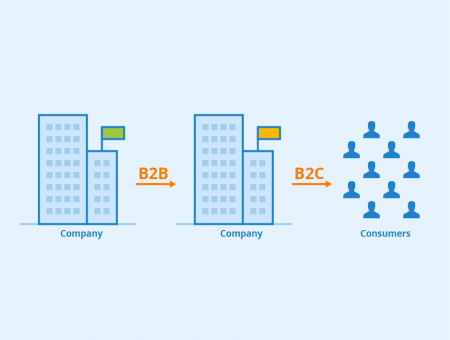B2B Marketing
Contents
Definition

The term B2B (Business-to-Business) marketing describes the marketing of products and services to organizational customers. The term industrial marketing is often used synonymously. However, B2B marketing does not only include the marketing of industrial goods but also, for example, the sale of products to trading companies and is, therefore, the more comprehensive term. B2B marketing customers include companies, retailers, government agencies, and many other organizational clients.
Particularities in B2B marketing
In order to successfully operate on B2B markets, you must take some special characteristics of this type of marketing into account.
The main difference between B2B and B2C (business to consumer) markets is the target group and the associated buyer decision process. Generally, the corporate decision-making process involves several people, which is why this process often takes longer than the purchase decision of private customers. In addition, company decisions are made on a rational and price-related level. The purchase decisions are much less emotional than with private customers, who often unconsciously orient themselves towards trends and mass phenomena.
Furthermore, B2B marketing often tailors and adapts products to individual customers or customer groups. B2B marketing is therefore generally characterized through market orientation (instead of product orientation).
Companies that operate business to business usually have a smaller number of customers than is the case with B2C relationships. Additionally, the target group is more defined, which is why contact with clients is direct and interactive. In contrast, B2C marketing uses mass marketing strategies (e.g. social media) to win consumers as buyers.
Selling services in the B2B sector
Since the products marketed in the B2B sector are often long-lasting industrial goods, product-related services generate a considerable part of revenues. Services are not tangible, so it is more difficult for customers to assess their quality before purchase. The sale of services, therefore, entails the problem of building trust between sellers and buyers. In order to meet this challenge, existing satisfied buyers are often given as references. Furthermore, customer-oriented behavior, effective corporate communication, the long existence of a company, a test phase at first contact, or different warranties can increase the trust in a company. Other important factors in asserting oneself against competitors and winning the trust of customers are professionalism and competence as well as a high level of customer orientation paired with high-quality services.
Differences between business to business and business to consumer marketing
As mentioned above, the main difference between these two types of marketing lies in the targeted audience: while B2B marketing mainly aims at corporations and focuses on selling capital goods, B2C marketing targets private individuals and the consumer market. The transaction volume in business-to-business transactions is therefore generally higher. It also results in a variety of other differences with regard to product, price, communication, and distribution strategies:
Product strategy
Products that are sold through B2B marketing are usually large investments for the buyer. This means that buyers pay special attention to high quality and the longevity of the product. In addition, customers in B2B markets often want products that are tailored precisely to their needs and can be reliably repaired without having to replace the entire product.
As part of the product strategy, it also is important to offer excellent services, so that buyers can be certain they will be supported with modifications and repairs even after buying a product. For this service orientation, it is essential to have competent contact persons who customers can turn to if necessary.
Pricing strategy
B2B marketing usually has no fixed discounts or special promotions such as supermarkets. Instead, prices and possible discounts are negotiated and adjusted based on the customer-specific product solution. Another important aspect are the agreed purchase conditions: Is there only a sales contract or also a service contract? When is the payment due? Are compensation transactions possible? In addition, the currency and possible financing offers are decisive for the purchase decision.
Communication strategy
In contrast to B2C marketing, communication aims at individual, mostly known clients. B2B market actors, therefore, seek and maintain direct contact. In addition, the products that are sold in business-to-business markets are usually very complex. Therefore, customers have to be informed about these products in a comprehensive and elaborate way. Tailoring products to the customer’s wishes further intensifies direct and personal interaction.
Establishing said contact as well as presenting one’s own products in a personal setting often happens at trade fairs. Complex products can be explained and demonstrated appropriately and trust between client and company can be built up. In addition to trade fairs, trade journals also play an important role in presenting products or other content in a professional manner.
In recent years, B2B companies also started to add social media to their communication strategies. One example is using blogs or video platforms for content marketing.
Distribution strategy
B2C marketing often relies on indirect distribution to anonymous buyers through contact via mass media such as television, the internet, social platforms, or print media. In contrast to that, business-to-business marketing is mostly characterized by direct sales. This is particularly necessary for products that are tailored to the individual needs of purchasers. With such non-standardized products, intermediaries are less likely to be considered. However, B2B markets can also sell standardized products, such as machine components, for which indirect sales structures are more appropriate.
Related links
- https://www.digitalauthority.me/resources/b2b-marketing/
- https://www.forbes.com/sites/forbesagencycouncil/2019/02/06/b2b-marketing-is-changing-and-you-can-no-longer-afford-to-be-boring/#2e314b65cc0f
- https://www.jotform.com/b2c-marketing/
- https://ninjapromo.io/b2b-inbound-marketing-complete-guide
| About the author |
 |